Brian Clegg's Blog, page 101
March 5, 2014
UPS oops
 This is an ex-UPS. It is dead. It has gone to the etc. etc.A little while ago we had a power outage while I was working on my computer. I experienced a millisecond of smugness, followed by considerably longer of serious irritation. Because I should have been able to comfortably shut down my machine and save all my working - instead the whole thing just went dead.
This is an ex-UPS. It is dead. It has gone to the etc. etc.A little while ago we had a power outage while I was working on my computer. I experienced a millisecond of smugness, followed by considerably longer of serious irritation. Because I should have been able to comfortably shut down my machine and save all my working - instead the whole thing just went dead.The reason for the brief smugness was a UPS - an uninterruptible power supply. It's essentially a very chunky extension lead that has built in both a surge protector and some heavy duty batteries which, with an inverter, keep the power going for about 15 minutes so you can sort things out without losing stuff.
I've had one for about 10 years now, and several times it has saved me from losing parts of a masterpiece. Of course those of you who work on laptops will be saying 'That's nothing, I can work for hours when the power goes.' And indeed you can, but I prefer a desktop. It's just the way I am. New dogs, old tricks - or something. Nothing to be done about it.
So why did everything disappear (luckily without any data loss as I wasn't in mid-type)? Essentially because my ageing UPS had given up the ghost. So it has now been replaced with a shiny new one.
Two morals, then.
1) If you work on a desktop and there's any danger of the power going out, it it really is worth investing in a UPS.
2) If you do have a UPS, be aware they don't last for ever and check it out now and again.
Take a look at UPS options on Amazon.co.uk

Published on March 05, 2014 00:24
March 4, 2014
Killing Hitler is harder than it looks
 Sorry, not available for killingA week or so ago there was a piece on one of the Guardian science blogs on the downside of going back in time and killing Hitler. Dean Burnett points out that this ever-popular time travel fiction theme is not necessarily a good idea. The main arguments against it seem to be the difficulty of deciding when to kill him - not as obvious as you might think (perhaps the best idea would be to make sure he's never born) and the unintended consequences argument. After all, even if taking Hitler out of the historical equation made sure that the Nazi atrocities didn't happen (not of itself a certainty), it could result in a chain of events where, say, an all-out nuclear war breaks out in the 1960s. Would you be prepared to take that risk?
Sorry, not available for killingA week or so ago there was a piece on one of the Guardian science blogs on the downside of going back in time and killing Hitler. Dean Burnett points out that this ever-popular time travel fiction theme is not necessarily a good idea. The main arguments against it seem to be the difficulty of deciding when to kill him - not as obvious as you might think (perhaps the best idea would be to make sure he's never born) and the unintended consequences argument. After all, even if taking Hitler out of the historical equation made sure that the Nazi atrocities didn't happen (not of itself a certainty), it could result in a chain of events where, say, an all-out nuclear war breaks out in the 1960s. Would you be prepared to take that risk?But the post misses the most obvious objection to going back and killing Hitler, which is that it's not possible.
Now, this might seem a silly complaint. After all, almost all science fiction features technology that isn't possible now - and many SF plots require the laws of physics as we know them to be seriously bent or outright broken. But the frustrating thing with time travel is that it is perfectly possible. There is nothing in the laws of physics that prevents it. (It's difficult, admittedly, but it's just an engineering problem.) However, real time travel is very different from time travel in fiction.
Firstly it's a lot harder to go back than forwards, where all fictional time machines seem to make no distinction. But more importantly, any backward time travel based on general relativity (which is the only means we know to make it happen to any significant extent) has a huge limitation. It doesn't involve reversing time - it's more about moving into a space where time has run more slowly and getting to the past that way. And that makes it impossible to time travel to a point before the time machine was first constructed.
So, at a stroke, killing Hitler is out of the window. It doesn't mean there might not be similar dilemmas for those who want to travel into the past once a machine has been created, to stop a future dictator before (s)he gets started. But Hitler is out of bounds.
Sorry, Dean, but killing Hitler is so last century.
Image from Wikipedia
Published on March 04, 2014 01:04
March 3, 2014
Another blow for traditional TV
 Be honest, how often do you sit down and watch TV as it is broadcast, live? I have to admit that this is a very rare phenomenon in Clegg Towers these days, mostly limited to the news. And Amazon has kindly just put yet another nail (admittedly a rather small and wonky one) in the lid of traditional TV watching's coffin.
Be honest, how often do you sit down and watch TV as it is broadcast, live? I have to admit that this is a very rare phenomenon in Clegg Towers these days, mostly limited to the news. And Amazon has kindly just put yet another nail (admittedly a rather small and wonky one) in the lid of traditional TV watching's coffin.When we moved house a few years ago we abandoned Sky, the price of which had gradually crept up until it was getting ridiculous, going Freeview+ across the board. Now a little payment has crept in, but we still pay around 1/10th what we used to pay for Sky in a typical month. Here's the line up:
YouView box - giving us the ability to record a couple of programmes at once. As a result we hardly ever watch a programme live, except the news. If it's a commercial channel, then you have the added benefit of being able to skip through the ads. And even better - you've got 7 days catchup on the main channels from the same programme guide. So anything we didn't record we tend to watch that way.Apple TV box - we pay £6 a month for Netflix and for that get more movies and TV boxed sets than we are ever likely to consume. Just finished the second season of House of Cards, which was absolutely brilliant. Currently hovering over starting Breaking Bad, which we've managed to resist. If we really need to watch a recent release, the same box gives us iTunes access to rentals in HD at comparable price to what we used to pay for DVD rentals.Blu-ray Player - Just occasionally we do still get things on disc, if only as presents, or where it's too obscure for the iTunes/Netflix, like our recent foray into The Lovers . The player has just got an added bonus as it's internet connected and has what used to be a Lovefilm Instant app, but is now Amazon Prime - so as Amazon Prime customers we get free access to the Lovefilm Instant free stuff. Not as good as Netflix, but some interesting non-overlapping content. I might finally get round to seeing Twin Peaks, which has come off Netflix, but is still on this service.Of the options the Amazon/ex-Lovefilm is by far the worst, because its user interface is fairly poor (this may be down to the Sony Blu-ray player: we haven't tried it on a computer yet). But even so it's yet more stuff to watch at no extra charge. (Admittedly you have to be an Amazon Prime member, but we are.) I can honestly say, it's delightful having so much material instantly accessible, meaning that you can easily avoid Ant and Dec or any other primetime rubbish that is put out by the main channels, while still picking up the good stuff (like the new series of Silk, just started).
I suspect to the youth of today there's nothing remarkable about streaming TV over the internet, but I still get a frisson of excitement that I can get such high quality video and sound, on demand 24/7. And on the whole, with the occasional glitch, it just works.
The fascinating thing is that TV has gone through a bigger revolution than the e-book entering the publishing market, yet at the moment the traditional channels seem to be thriving. Profits are up at ITV, for instance. It could be because there are so many households that do still watch stuff as it comes through the aerial or the Sky box without practically everything being time shifted or streamed. So it could be a case of dead service walking. But these are certainly interesting times.
Published on March 03, 2014 02:55
February 28, 2014
Not getting IFTTT
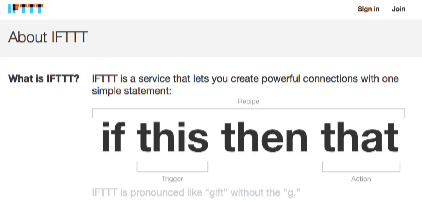 Just occasionally everyone raves about a piece of software and I really don't get it. I never got Pinterest or Instagram, for instance. In those cases it's just that they aren't really useful to me - but the service I'm struggling with here really feels like it's something that should be valuable. And time after time I go to it, think hmm... and get nowhere.
Just occasionally everyone raves about a piece of software and I really don't get it. I never got Pinterest or Instagram, for instance. In those cases it's just that they aren't really useful to me - but the service I'm struggling with here really feels like it's something that should be valuable. And time after time I go to it, think hmm... and get nowhere.It's called IFTTT, short for If This Then That, and its role is to automate those trivial repetitive tasks we find ourselves doing. The concept is simple but powerful. You have a trigger, which is something happening on anyone of 82 services (or 'channels' as IFTTT confusingly calls them), such as email or Facebook or Evernote, etc. etc. When that something happens, IFTTT automatically carries out an instruction. It could be to send you a text, or perform a task in another service.
Examples work better than the abstract with this kind of thing. You can write your own 'recipes', but IFTTT provides some examples to get you started. We're talking this kind of thing:
Send me an email if it's going to rain tomorrowSend an item I favourite in Pocket to EvernoteSend a text to EvernoteDownload any video I favourite on YouTube to Google DriveRepost my tweets on LinkedInBackup my Dropbox photos on FlickrYou get the kind of thing. It feels like it should be incredibly useful. Yet I struggle to find a single task I want to automate. It always needs tweaking or changing in some way that means the automation doesn't quite deliver.
I'm not going to give up. I'll keep trying it now and again. But IFTTT is still on my 'don't quite get it' list.
Published on February 28, 2014 01:46
February 27, 2014
Fluoridation follies
 There is a long standing campaign in the US to stop fluoridation of drinking water, due to concerns about the dangers of sodium fluoride. (Most of the UK doesn't do this, though around 10 per cent of us get fluoridated water, and most of our toothpastes contain sodium fluoride.)
There is a long standing campaign in the US to stop fluoridation of drinking water, due to concerns about the dangers of sodium fluoride. (Most of the UK doesn't do this, though around 10 per cent of us get fluoridated water, and most of our toothpastes contain sodium fluoride.)I have no particular axe to grind on this, though I would be rather surprised if there is a significant health risk with this particular salt - NHS England says 'Reviews of the risks have found no evidence to support these concerns and the general consensus is that water containing the correct amount of fluoride and fluoride toothpaste have a significant benefit in reducing tooth decay.'
What I do object to, though, is when people use scaremongering tactics - specifically making statements that are irrelevant or unsubstantiated.
The other day, as you do, I got one of those graphics sent to me on Facebook, which I have attached here. And it's hard to imagine a better example of naughtiness in misleading statements. Let's take those facts:
Waste product of the fertiliser and aluminium industry - it may be, I don't know. But so what? Many dangerous production processes have water as a waste product. Does that mean water is the 'silent killer'? (It's certainly true that water has killed far more people than sodium fluoride.)Basic ingredient of Sarin and PROZAC - Certainly both contain fluorine, though I don't know if sodium fluoride is used in the manufacture. But even more so, so what? That's like saying 'Ricin is the most poisonous substance known to man. Carbon is its main ingredient. So don't consume carbon. It must be bad for you.' It makes no sense at all.Used in Nazi prison camps - I can find no evidence that sodium fluoride acts as a sedative, and it's a very unlikely salt to do so. Nor can I find any evidence that the Nazis made any use of it - this seems to have emerged as a construct in some anti-fluoridation literature. If in doubt, bring the Nazis in.Used as an insecticide - no it isn't. The only recently-used fluorine containing inorganic insecticide was sulfuryl fluoride, though that has now been discontinued. Having said that, sodium fluoride was once used as an insecticide. In sufficient quantities (which isn't much for an insect), sodium fluoride is poisonous, but as with all poisons (water is poisonous if you drink too much at once, as is eating too much chocolate), it is the dose that is all-important, and at the levels in drinking water or toothpaste, sodium fluoride is not toxic to humans.All the 'Linked tos' - only in anti-fluoridation literature. At the levels in water/toothpaste no good trial has shown any of these. The trouble with this sort of claim is that it can be true but irrelevant. For instance, practically everything we eat can be 'linked to cancer' in that if you feed enough of it a rat it may well develop a cancer. Again it's all about quantities and risk. Eating celery, for instance, has a small cancer risk. But it's so small it isn't worth worrying about.So there you have it. I have no objection to proper arguments being put forward against fluoridation, but using 'facts' of this kind is not the way to go about it.
[UPDATE 9:51 27/2/14]
Thanks to Anthony Morris for providing a link to this review - it doesn't in any way make the misleading and untrue statements in the graphic okay, but it appears to be interesting evidence in terms of impact on one of the 'linked to's - children's IQ.
I would point out, though, that this is for high levels of fluoridation (specifically it provides 'Sensitivity analyses of pooled random-effects standardized weighted mean difference (SMD) estimates of child’s intelligence score with high exposure of fluoride.') And my other concern with it is that I couldn't find any absolute figures for the reported IQs, only a weighted mean difference of -0.45, which is pretty negligable unless I misunderstand it.
Published on February 27, 2014 01:19
February 26, 2014
Facebook isn't all bad
 The inevitable vampire bunny from
The inevitable vampire bunny fromDracula, the Pantomime*I know it's trendy to pooh-pooh the social networking giant, and speak of the way Facebook is so yesterday. And, of course, one doesn't need virtual friends, one has real ones. And all that guff. But, in fact, in a world where many of us don't stay in one place, and may have contacts around the world, I think Facebook does have a lot going for it.
Let me give you two quick examples. I used to be a member of a writers' online group called Litopia. Over the years some of the people I liked best left, and then the whole thing folded. But I had made real friends - people who I would happily go out for a drink with if we were in the same city - and I was in danger of losing touch. One of our number (partly as a result of my moaning) set up an invitation-only group on Facebook, which is now 120 strong, and it has kept those virtual friendships going - and brought a good number back into the fold. Facebook made this easy to do, compared with all the faff of setting up and moderating an online community.
Here's another example. I'm gradually digitising my pre-digital photos to have a more comprehensive collection in the places I tend to look at photos these days (and to have a Cloud-based backup, which means I wouldn't lose my precious pictures in a fire). A few days ago, I put up a set of pictures from the mid-1990s of a couple pantomimes I wrote and directed, starring the members of a youth group I helped run. I put these up on Flickr and made the only person I was still in contact with from the group aware via Facebook. Within a day I'd made a whole string of connections with people I haven't seen for nearly 20 years - and it's really rather a nice feeling.
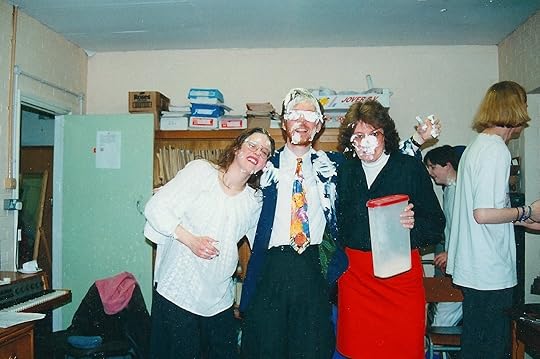 The fate of an author/director at the end of the run of a youth group pantomimeSo don't always paint Facebook as evil. Yes, it's too big and powerful. And manipulative. Yes, it has problems. But it can also put a smile on your face and re-connect you with people you thought you'd never see again. Which can't be a bad thing.
The fate of an author/director at the end of the run of a youth group pantomimeSo don't always paint Facebook as evil. Yes, it's too big and powerful. And manipulative. Yes, it has problems. But it can also put a smile on your face and re-connect you with people you thought you'd never see again. Which can't be a bad thing.* The vampire bunny was shamelessly lifted from a joke in the old radio comedy show, I'm Sorry, I'll Read that Again. To get the joke, you have to be aware that in the even older TV quiz show, Take Your Pick, the culminating game involved the contestant choosing between opening a box or taking cash. The audience would shout out 'Open the box!' and 'Take the money!' So, in the panto, a character is running away from the vampire bunny and finds a coffin to hide in. Should he hide, or should he attack the monster rabbit? The opposing shouts go up 'Hop in the box!' and 'Stake the bunny!'
Published on February 26, 2014 00:45
February 25, 2014
Would popular science counter creationism?
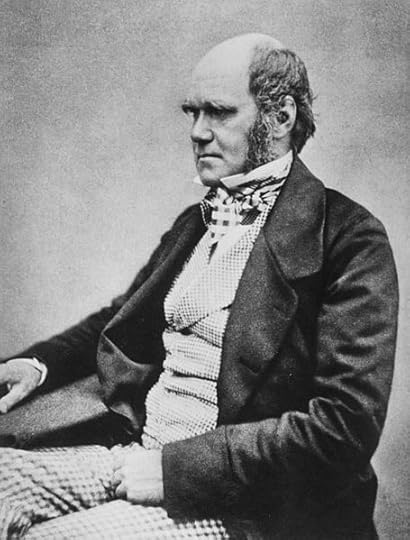 Bringing me in doesn't make it
Bringing me in doesn't make itteaching creationismThanks to Ian Campbell for pointing out a report to me, publicised last week, on the best way to 'tackle creationism in the classroom. The blaring headlines suggested 'Children should be taught about creationism in science lessons to avoid alienating those of strong faith,' but before the radical atheists start foaming at the mouth, I'm not sure that's what the study actually concluded. (Actually it's too late to prevent the backlash. Apparently 'Richy Thompson, campaigns officer at the British Humanist Association, said: “Young Earth creationism and intelligent design should not be given credence and taught as scientifically valid for the simple reason that they are not.”'
But did the study suggest this? Admittedly there was the inflammatory statement 'If [evolution] is presented insensitively, students may feel compelled to choose between science and deep-rooted religious beliefs. Rather than asking whether religious views should be covered in science lessons, the question is can we afford not to talk about them?' But one of the people who appears to be involved in the study (I only have indirect reporting on it, which isn't totally clear), Pam Hanley of York University said 'I wouldn’t for a moment say you should teach creationism in science, but you could certainly talk about evolution in the context of when Darwin first published his ideas, when it was challenging the religious orthodoxy.'
So, no one appears to be suggesting we teach 'Young Earth creationism and intelligent design... as scientifically valid.' Rather, what they appear to be saying is, rather than plonkingly teach evolution as 'This is how things are, accept it,' instead they take the popular science approach of giving the context of the discovery. Don't just teach what evolution is, but explain how it came about. I think that is totally uncontroversial. In fact, I'd suggest we ought to be using the techniques of popular science far more in the science classroom if we want to overcome the general impression that science is boring. It doesn't mean you shouldn't do the grunt work with formulae and experiments and all that good stuff too, but some context of how the theories were developed can really make them seem more relevant and comprehensible.
So was this a storm in a religious tea cup? I think so. The study raises a point worth making, because a fair number of students coming from strong religious backgrounds, particularly muslim and Christian, do reject evolution when simply presented with it as 'scientific fact' because such an approach is not strong enough to come up against deeply held beliefs. But with more context, there is every possibility that some (not all - there will always be those who can't look around the blinkers) will expand their worldview to take in the stance that evolution and their religious beliefs do not have to be incompatible.
Image from Wikipedia
Published on February 25, 2014 01:27
February 24, 2014
More QI QuIbbles
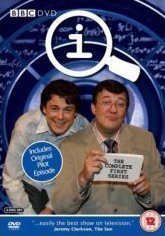 I enjoy the TV show QI with its combination of fascinating facts and entertaining banter, but occasionally the programme's smugness gets too irritating, especially when it gets things wrong - and I have in the past (here, here and here) moaned a bit about this. It's doubly irritating when QI spends part of its time attacking the fact checking on another show, as the first of the K series (repeated last week on the BBC) did.
I enjoy the TV show QI with its combination of fascinating facts and entertaining banter, but occasionally the programme's smugness gets too irritating, especially when it gets things wrong - and I have in the past (here, here and here) moaned a bit about this. It's doubly irritating when QI spends part of its time attacking the fact checking on another show, as the first of the K series (repeated last week on the BBC) did.It was rather ironic that the show itself happened to contain two errors itself.
One was on the matter of the red kite. Stephen Fry asked what colour a red kite was, and inevitably the siren sounded as someone said 'red'. He pointed out the quite interesting fact, featured in my book Light Years , that orange wasn't given a name as a colour until around the sixteenth century, and until then 'red' was used for both red and orange (the word 'orange' existed, but just for the, erm, red fruit). But the boo-boo was that he said that a red kite was orange. In fact, it's brown. Yes, it has an orange patch, which gives it the red name, but there is no doubt whatsoever that this is a brown bird. Wrong, QI. (Actually biologists, get your act together. It's not red. It's not a kite. What are you on? Though I admit 'brown bird' would be a bit generic as a name.)
 What colour is this bird? It's brown!More worrying was the way a totally wrong answer was allowed through. If Mr Fry has one failing, it's a tendency to be overly impressed when one of the participants comes up with a bit of science whereupon he tends to lavish praise them - unfortunately, in this case, the science was wrong, but he didn't realise, which was fair enough, but also the 'elves' in the background didn't pick up this glaring error.
What colour is this bird? It's brown!More worrying was the way a totally wrong answer was allowed through. If Mr Fry has one failing, it's a tendency to be overly impressed when one of the participants comes up with a bit of science whereupon he tends to lavish praise them - unfortunately, in this case, the science was wrong, but he didn't realise, which was fair enough, but also the 'elves' in the background didn't pick up this glaring error.Fry was going on about the size of the intestine, and someone said that the human intestine was far too long for a meat eater, which proved that we were naturally 'vegetarian', one of only three animals that had switched diet over time, and this was why we find meat so hard to digest. I'm sorry, but this is rubbish, pedalled by those trying to justify vegetarian and vegan diets, with no good evidence to back it up.
Firstly there are other animals, for instance, the capuchin monkey, with very similarly proportioned gastrointestinal setups and guess what? They aren't 'vegetarians' - they are omnivores, consuming a diet that's roughly 50:50 meat and fruit/vegetable. Our gut morphology indicates that we are omnivores. Our teeth indicate we are omnivores. The fossil record bears this out, showing humans have always eaten meat as part of their diet, as does our handling of various nutrients that makes an omnivorous diet the best for our requirements. The suggestion is pure woo.
Sorry QI - big fail here in not picking up the panel member on her error.
Images from Wikipedia
Published on February 24, 2014 00:56
February 21, 2014
Dose his tea, matron!
 This is a bit of a late arrival for one of my Royal Society of Chemistry podcasts, as I didn't get round to blogging about it when it was published - which is a bit of a shame, as we are talking potassium bromide, that compound of legend, that was allegedly put in the tea of the troops in an attempt to reduce their sexual drive.
This is a bit of a late arrival for one of my Royal Society of Chemistry podcasts, as I didn't get round to blogging about it when it was published - which is a bit of a shame, as we are talking potassium bromide, that compound of legend, that was allegedly put in the tea of the troops in an attempt to reduce their sexual drive.That does seem to have been a myth, but it doesn't stop this simple compound having a rather juicy history. So pin back your ears, suppress your libido and take a listen by clicking play on the bar at the top of the page - or if that doesn't work for you, pop over to the full page.
Published on February 21, 2014 01:47
February 20, 2014
Why is science boring?
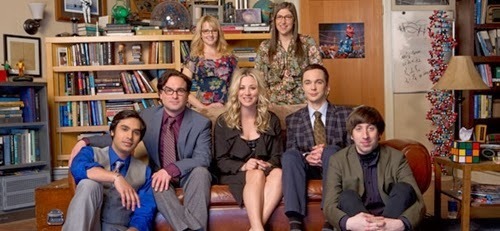 Making science more approachable?
Making science more approachable? (Photo of The Big Bang Theory cast courtesy CBS)I think science is wonderful, fascinating, life-enriching, and generally the best thing since the big bang. So it may seem odd to head up a post 'Why is science boring?' - but the fact is, like it or not, the majority of people consider it to be so. So those of us whose job is communicating science need to be aware of this and its implications.
Despite occasionally enjoying pointing out its failings, I am quite fond of QI, and have observed something quite interesting about the general attitude to science there. If there is a guest with a science background like Dara O'Briain or Ben Miller, then whenever that person answers a science question with a little bit of detail the other team members glaze over and generally act bored.
So why does this happen, and how can we get around the issues? Here's a few thoughts, which I can guarantee aren't comprehensive, but are a starting point.
A lot of science teaching is boring. If you are a science teacher, I'm sorry, but this is true. A fair amount of the blame is down to the curriculum - it is still essentially Victorian, and ought to be re-written from the bottom up, as at the moment it ignores most of the really exciting bits of science like relativity or quantum theory or epigenetics. Some of it is down to the teaching itself. It doesn't help when, say, a biology teacher is trying to teach physics. But we definitely need more inspirational teaching in the sciences.A lot of scientists are boring. Actually most of them. Of course there are wonderful exceptions who are great communicators, but they are still in a tiny minority. In part the answer here is more teaching of science communication. I really believe it should be a standard part of a scientist's training how to communicate to the general public, as in the end, continued funding often depends on public support. One problem scientists face is that they are too picky about accuracy, which means they are always qualifying their answers or making them far too detailed. Sometimes you have to smooth things over a bit to get the point across. Think of it as rounding. Another issue is that they have usually forgotten the difference between jargon and normal English.A lot of science is put across without enthusiasm. There seems to be a strange leap made from 'We are doing a serious piece of work' (true) to 'We we need to come across as serious people.' Take a lesson from business. Business people are serious about their work, but when they are telling people about their products and services, they make it interesting, enjoyable and sometimes even fun. That's why I like things like Festival of the Spoken Nerd which puts across science with enthusiasm. Another lesson from business is they use professional communicators to do the communicating. Science should do more of this too.Give context. Science is generally very focussed on the experiment or model or theory. That's fine, scientists could learn a lot from popular science in that context - history, (potential) applications, stories about people all helps to make the science itself more approachable.Challenge the glaze. If someone you are talking to does the QI glazed boredom bit, ask them why it's happening. You're a scientist - do a bit of research.Politicians don't care. Our politicians are largely ignorant of science or even science-phobes. We need more people in parliament who understand science and its importance to the country. Without a political backing it is difficult to get money behind the right initiatives. ... I'm sure you have thoughts too. Feel free to add them!
Published on February 20, 2014 02:57



